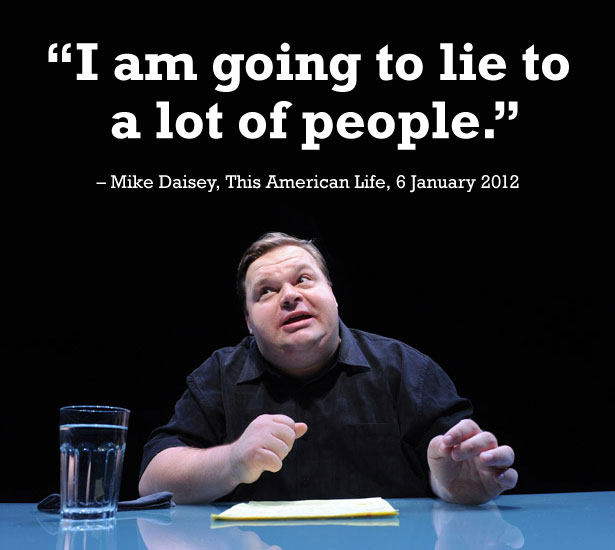How To Spot A Liar
Like most people, I’ve been lied to a few times in my life. I’ve even told a few (though, as my wife will attest, perhaps not as many as I should). No one likes being lied to.
That’s one of the reasons I was attracted to journalism and photography – they’re about telling the truth. It may be a personal, subjective truth, but it’s a truth nonetheless.
It’s also why I started a magazine all about true stories. We even held a series of storytelling performances not unlike Mike Daisey’s theater show.
Yes, this is about Mike Daisey.
But I’m not going to get into the subjective nature of truth, what’s appropriate in theater, or Mr. Daisey’s seemingly pathological need to nail himself to a cross. I just wanted to share this one observation.
Like anyone who’s been lied to, I’ve made an effort to become more aware of when the person talking to me may be a liar. This can get complicated. You can get caught up in lots of micro-expressions, language patterns, and telling gestures. But in my experience, there’s one sure-fire way to know when you’re dealing with a liar: they tell you.
In Mike Daisey’s original, now retracted, This American Life story, he says:

In context, he’s saying this to his interpreter, in an effort to convince her to help him pose as a businessman (an effort that, we now know, was also largely fabricated because his translator needed no convincing and planned to do this from the outset).
When I heard him say that in the original story, I was driving down Divisadero in my car, and I blurted out: “Then how can I trust anything you say?”
Here was a man telling an extraordinary story and admitting that he was a liar. If he lied to those businessmen, how could we really know he wasn’t lying to us?
There’s a reason that journalists are trained not to do this, and it’s not just highfalutin professional ethics. It’s far more practical: If you lie to get the story, it throws the entire story into doubt. Tell the audience you’re a liar and they stop believing you. Or, at least, they should.
If you traffic in true stories, you can’t lie to your audience, period. I don’t care if it’s in a book or on a stage or over the radio. When you tell a personal story, you absolutely know if the words coming out of your mouth are true or not.
Mike Daisey knew he was lying to us. I’ll never believe another word he says.
